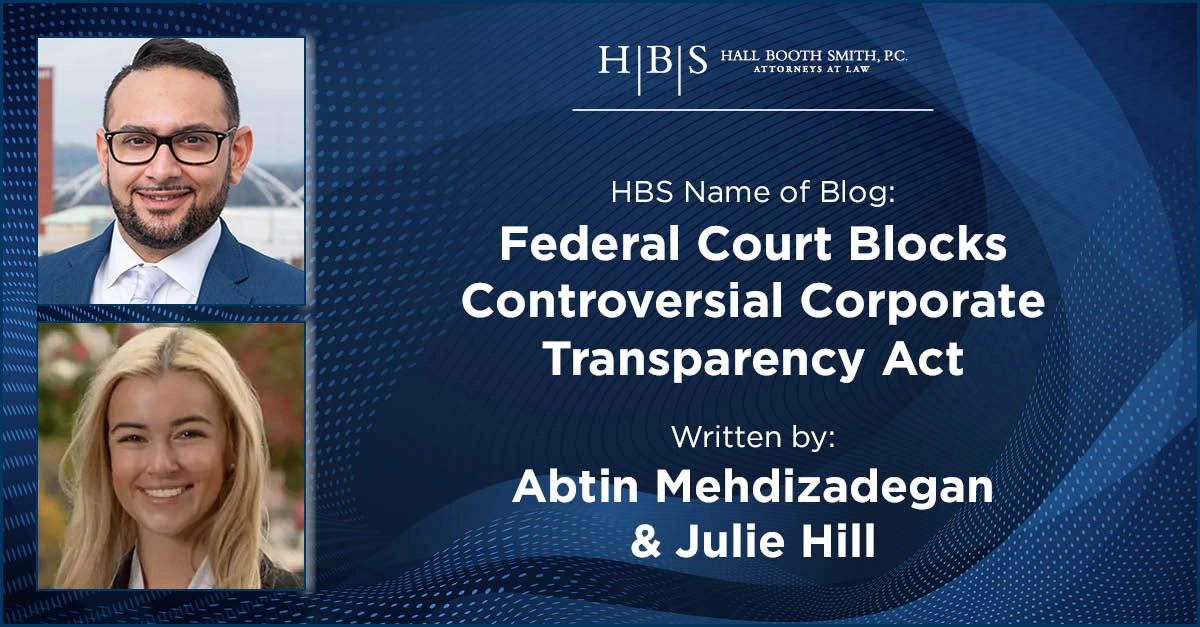
Federal Court Blocks Controversial Corporate Transparency Act
On December 3, 2024, the U.S. District Court for the Eastern District of Texas issued a landmark decision enjoining the enforcement of the Corporate Transparency Act (CTA). In Texas Top Cop Shop, Inc. et al. v. Garland et al., the court held that the CTA, which requires extensive disclosure of beneficial ownership information, likely exceeds Congress’s constitutional authority. The ruling prevents implementation of the Act and its accompanying regulations nationwide, and corporate finance teams that were feverishly working to meet the January 1, 2025 compliance date can enjoy a moment of respite.
Background
Enacted in 2021 as part of the Anti-Money Laundering Act, the CTA aimed to combat illicit financial activities by mandating that millions of small businesses—corporations and LLCs—report sensitive ownership information to the federal government’s Financial Crimes Enforcement Network (FinCEN). Failure to comply could result in severe penalties, including fines of up to $10,000 and imprisonment. Proponents argued that the Act would increase transparency and curtail the misuse of shell corporations for money laundering and other crimes. However, critics labeled the CTA as an unconstitutional expansion of federal power, infringing on traditional state regulation of corporations, free speech, and privacy.
The Court’s Decision
The district court ruled that the CTA likely violates the Ninth and Tenth Amendments by intruding on state sovereignty and regulating entities created under state law. The court also found that the Act compels speech and burdens associational rights under the First Amendment, while its disclosure requirements infringe upon privacy protections under the Fourth Amendment. The decision emphasized the historical role of states in corporate governance and the Constitution’s limits on federal authority. The court held that the CTA’s reporting mandates and accompanying penalties impose unconstitutional burdens on businesses without a sufficient nexus to federal authority.
Implications for Businesses
The holidays came early in 2024 as this ruling spares approximately 32.6 million businesses from the compliance costs that FinCEN estimated at $22.7 billion in the first year alone. Businesses are no longer required to submit beneficial ownership information by the previously established deadlines, and unless and until an appellate court reverses the district court, the CTA’s reporting requirements are entirely enjoined. This means that sensitive personal and financial information will remain confidential, alleviating concerns about potential misuse or unauthorized access.
While the preliminary injunction halts enforcement of the CTA for now, the litigation is far from over. The government is expected to appeal the ruling, and the case could ultimately reach the U.S. Supreme Court if the incoming Trump Administration proceeds with the appeal. Businesses should remain vigilant as the legal landscape evolves, especially as states respond to this ruling by enacting similar state-level disclosure requirements. Businesses should monitor developments in the case to understand if compliance obligations are reinstated. For businesses that preemptively started collecting beneficial ownership information, review and secure any gathered data to avoid unnecessary risks, and consult with counsel to determine whether such records should be destroyed.
At Hall Booth Smith, we will continue to provide updates on this case and its implications for businesses nationwide. If you have questions or need assistance with compliance strategies, please contact us.
Disclaimer
This material is provided for informational purposes only. It is not intended to constitute legal advice nor does it create a client-lawyer relationship between Hall Booth Smith, P.C. and any recipient. Recipients should consult with counsel before taking any actions based on the information contained within this material. This material may be considered attorney advertising in some jurisdictions. Prior results do not guarantee a similar outcome.
About the Authors
Abtin Mehdizadegan
Partner | Little Rock Office
T: 501.503.4445
E: abtin@hallboothsmith.com
Abtin Mehdizadegan is a Partner in our Little Rock, Arkansas, office and represents employers in traditional labor and employment law matters. He has extensive, high-stakes experience defending businesses in class and collective action lawsuits, employment and wage and hour lawsuits, labor grievance and arbitration proceedings, individual and systemic proceedings before the Equal Employment Opportunity Commission (EEOC), unfair labor practice charges before the National Labor Relations Board (NLRB), federal wage and hour audits involving the Department of Labor’s Wage and Hour Division (DOL/WHD), unemployment appeals, business disputes, products liability defense, and constitutional law litigation.
Julie Hill
Attorney at Law | Little Rock Office
T: 501.455.9172
E: jhill@hallboothsmith.com
Julie Hill is an Associate in our Little Rock office, focusing on agribusiness and food and general liability matters.




Leave a comment
You must be logged in to post a comment.